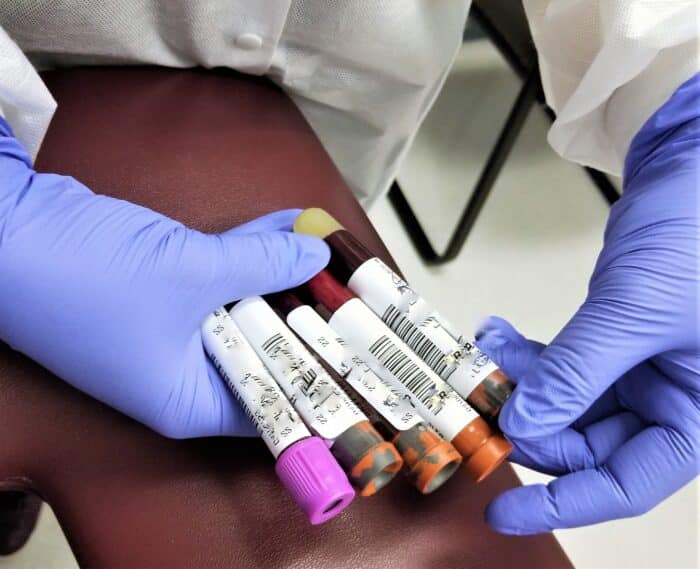If you’re an aspiring phlebotomist or are interested in stepping into the world of phlebotomy but don’t know where to begin, you’ve come to the right place.
Phlebotomy is the perfect career for those interested in entering the healthcare industry but who want to avoid the hassle of attending years of schooling and thousands on tuition.
This profession of drawing blood is also one of the most important in the healthcare industry since it helps diagnose a multitude of diseases.
Becoming a phlebotomist is a good way to get into the medical field, but there are some costs you need to know about.
In this article, we’re going to break down those costs for you. We’ll talk about how much you might need to spend on training, and more.
So, if you’re curious about how much it takes to become a certified phlebotomist or if you’re just thinking about a career in healthcare, get your reading glasses on!
Read: What is a Phlebotomist
Cost of Phlebotomy Certifications
Becoming a phlebotomist is the best way to learn and work in healthcare. It’s a profession with good job security, flexible hours, a decent paycheck, and the chance to help people.
But you might wonder, how much does it cost to get certified as a phlebotomist?
Well, it usually adds up to somewhere around $200, depending on which certification you pick.
You’ve got several choices when it comes to phlebotomy certifications, and each comes with its own price tag and ongoing renewal fees.
Also Read: Phlebotomy Certification
Let’s explore:
Certified Phlebotomy Technician (CPT) – National Healthcareer Association (NHA)
The National Healthcareer Association (NHA) is a well-known organization for phlebotomy certification. When students pass the NHA Certified Phlebotomy Technician (CPT) exam, they can work as phlebotomists in most states, except California, Nevada, and Louisiana.
To be eligible for the exam, you need to finish a phlebotomy program from an accredited source and have experience with at least 30 successful venipunctures (drawing blood from veins) and 10 capillary sticks (drawing blood from small pricks).
The first time you take the CPT exam, it costs $117.
After that, you have to get recertified every two years. This involves completing 10 continuing education credits and paying a fee of $179. This helps you stay up-to-date in your field and maintain your certification.
Certified Phlebotomist Technologist (CPT) – National Phlebotomy Association (NPA)
The National Phlebotomy Association provides certification tests for people starting out as phlebotomists or those who want to teach phlebotomy.
To be eligible for this test, you need to finish a recognized phlebotomy training program that involves 160 hours of learning and 200 hours of hands-on practice.
The first test you take costs $90, and to keep your certification, you need to be an NPA member, which costs $100 per year.
Phlebotomy Technician (PBT) – American Society for Clinical Psychology (ASCP)
The American Society for Clinical Pathology (ASCP) provides a certification test for people who have finished an accredited program and have done at least 100 venipunctures.
Taking their certification test will cost you $135, and the good news is, there’s no yearly fee to keep your certification.
Phlebotomy Technician Certificate (PTC) – American Society of Phlebotomy Technicians (ASPT)
If you want to do the PTC exam by the American Society of Phlebotomy Technicians, you must finish a recognized program and do 75 successful venipunctures.
The test itself costs $175, and you also need to pay $35 every year to keep your certification.
Phlebotomy Technician Certification (RPT) – American Medical Technologists (AMT)
American Medical Technologists is an organization that certifies people in various medical jobs.
To take their certification test for phlebotomy, you need to finish a 120-hour training course and do at least 50 venipunctures.
The test costs $125, and every year after that, you’ll need to pay $75 to keep your certification valid.
Conclusion
Knowing the expenses for phlebotomy certification is a crucial part of your journey into healthcare. By understanding the expenses and what you can gain, you can make a smart choice about getting certified in phlebotomy.
See: Phlebotomist Job Description
Related Resources:
- Phlebotomist Duties
- Which Two Skills are Important for a Phlebotomist?
- Phlebotomist Degree
- How To Get a Phlebotomy Certification
- What are the Different Types of Phlebotomy Certifications?
- Phlebotomist Cover Letter
- Is a Phlebotomist a Nurse?
- Phlebotomy Course
- Phlebotomy Classes
- NHA Phlebotomy
- Order of Draw Phlebotomy
- Phlebotomy Certificate
- Phlebotomy Internship
- Phlebotomy Classes Cost
Related Articles
-
How to Be Successful in College in 2022 – 7 Simple Tips to Succeed
-
How Do Scholarships Work? Read This First…Truth is Shocking
-
7 Best College Majors 2024: What Should I Major In?
-
How to Choose a College – 10 Things You Must Consider in 2024
-
Why Go to College? Top 13 Benefits for Adult Students in 2022
-
Top 5 Best Alternatives to Community College for 2024








